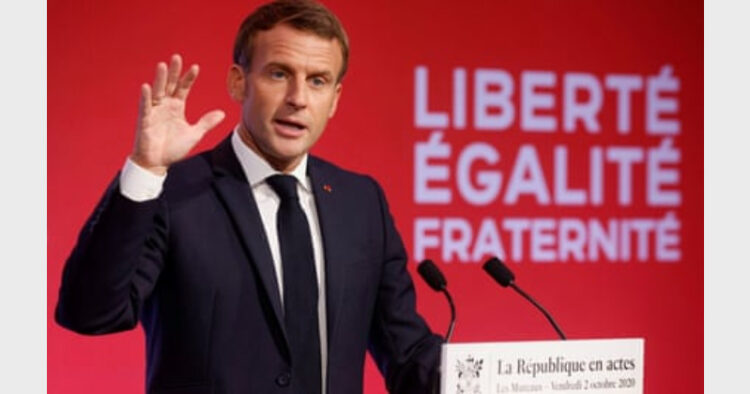Agrah Pandit

France has brought out a new draft law to arm itself against the growing threat of “radical Islamism” and thus protect French republic from “Islamist hydra” that promotes violence. Originally named the “anti-separatism” bill, it is given a softer name “draft law to strengthen republican values” after the criticism. “The enemy of the Republic is a political ideology called radical Islamist which aims to divide the French among themselves” Prime Minister Jean Castex commented while presenting the bill, “This undermining is often the result of a pernicious ideology whose name is radical Islamism… its objective is to divide the people and spread hate and violence in society. This is what we call separatism.”
Islamist separatism is “all the more dangerous because it is the manifestation of a conscious, theorized, politico-religious plan whose ambition is to impose religious norms on common law,” the Prime Minister continued. He said instead of targeting Muslims or Islam, the law aims to “free Muslims from the growing grip of radical Islamism…it is a law of protection, a law of emancipation from religious fundamentalism.”
Proposed Law
The law envisages a slew of measures, including reforms in school education, tightening state oversight on mosques and preachers, regulation of online hate campaign, curb on foreign funds, etc.
The law would offer protection to moderate leaders of Muslim community who are in danger of being overthrown by an “extremist putsch”. Mosques are required to be registered as places of worship so as to identify them better. Foreign funding to them will have to be declared. A person with the known record of provoking violence can be barred from frequenting mosques.
Under new proposed law, kids above age three would ordinarily have to receive education in state-mandated public schools not in “underground Islamic structures”. Education Minister has termed Home schooling in many cases as a “cover for clandestine Salafist structures”.
Doctors are barred from issuing “certificates attesting to a person’s virginity”—a certificate oftentimes demanded from a girl ahead of Muslim marriage. Couples would be interviewed separately by officials, prior to the marriage, to weed out any occurrence of forced marriage. Officials could not entertain the request for residency permits to a polygamous applicant.
Online hate speech/campaign would have state oversight so that the Islamists could not build up a virulent campaign as they did against a French teacher Samuel Paty, resulting in his beheading by a Chechen refugee.
Rationale
There have been fears that the law will stigmatise the France’ Muslim community of 40 lakhs—around 6% of the population—the largest in Europe. However, the government says that the law is a response to a series of terrorist attacks and beheadings in last few years and growing radicalization amongst France’s Muslims. France has been a fertile recruiting ground for Islamists for few years now. It has provided highest number of Jihadists, amongst European nations, to fight for Islamic State ISIS in Syria and Iraq. It itself has been a victim of it, with no fewer than 250 people killed over last five years.
Islamist radicalism is seen today as the biggest threat to France’s own brand of state-enforced secularism, known as laïcite’. France increasingly sees Islamic terrorism not only as a security threat but also a social problem. 79% of France’s respondents, in a recent nation-wide survey, agreed that Islamism is at war with France. 88% of French people responded as being worried about the rise of Islamist while 58% were “very worried”.














Comments